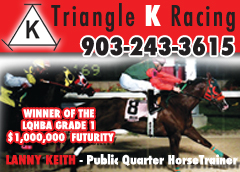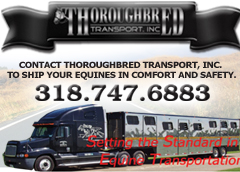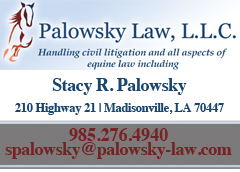Written by Barbara Newtown
Original Publish Date April 2013
Darryl Guillory, of Church Point, LA, is a Creole and a cowboy. Like all things Creole, he is a mix of traditions and races. And he can cook: in fact, his recipe for crawfish etouffee was just published in Ranch & Reata magazine (December/January 2013). His cowboy credentials are superb: he was profiled in Western Horseman in October 2011. But there is more to being a famous South Louisiana cowboy than just getting into print: Darryl can round up the rankest, wildest cattle—even cattle that have been terrorized by four-wheelers.
“I come from a family of cowboys,” says Darryl. “If there was something you couldn’t catch, you’d call my dad.” Dense Louisiana swamps and thickets made roping impossible, so the elder Mr. Guillory would go out alone with bulldogs (“catch” dogs) and always pen the cow. “There weren’t too many guys back then who could do one-on-one with cattle like that. My dad did it and I picked it up. If you had a cow out in the woods that would try to fight you, that’s when my dad would go out there with his bulldogs. Whatever he told them to catch, they’d catch it.” Good bulldogs chomp onto a cow’s mouth or nose when the cow is running; the cow jerks its head up and then brings it down close to the ground to try to shake the dog off. The pressure on the nose deadens nerves in the back and “the cow just flips,” says Darryl.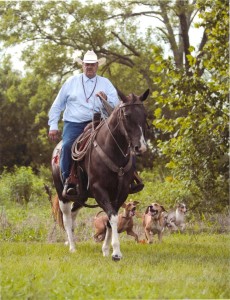
“That’s how bulldogging started in the rodeo,” he explains. Bill Pickett (1870-1932), the legendary black cowboy, Wild West revue star and movie stuntman, invented steer wrestling when he copied bulldog technique and brought down full-grown steers by biting them on the nose and twisting their horns until they fell. These days, human bulldoggers don’t bite—and Darryl uses Black Mouth Curs and Catahoulas to “bay” a cow to a halt and circle it. “It’s a natural instinct. In the wild, a herd of buffalo will bunch up to protect their young, and the coyotes or wolves will circle the herd and try to grab the weak ones. Once you dog-break a herd of cattle, it’s a simple thing to get them. I can go out on horseback with one or two other people on horses and two or three good dogs and round up 100 head of cattle that would take twenty or thirty regular cowboys to pen up.”
Darryl gets calls from all over Louisiana and neighboring states to come pen up cattle that others can’t handle. He likes to question the owner closely about what the cattle have already experienced. “Sometimes they get upset when I’m asking,” he says. Darryl needs to know if the cattle have been hassled by four-wheelers. “A lot of people get to where they’re running the cows with four-wheelers, and the cows get out of control. The more you run them, the worse it gets; the cow gets to a point where it wants to fight the four-wheeler.”
Four-wheeling is fun, and that’s the problem. “When there’s a four-wheeler roundup, you’ve got family and friends and kids, and it’s fun to keep running them. Four-wheelers don’t get tired. People get out-of-hand with it. They do more harm than good. And then they say I can’t go out there with dogs. They think I’m destroying the cattle, cutting them up.”
When Darryl knows a herd has been traumatized by four-wheeling, he sends the dogs out to “bay” the cattle and let them run as far away from the pens as they can get. He lets the dogs bunch up the herd and bay them until their heads start dropping and they want to fight the dogs. “As long as their heads are in the air, they’re ready to run. When their heads come down—the lead cow’s head comes down first—what I do is pull the dogs off, put the dogs behind them, and let the herd walk a piece. When they start trotting, I let the dogs get ahead of them and stop them again. Eventually when they start trotting they’re waiting for the dogs to come at them again, and they’re ready to stop. Once you’ve got the herd under control where they don’t run, then you can walk them right up to the pen. If they don’t want to go in, I make the dogs bump them, and they back right in.” The key is knowing how to “read” a cow. Darryl has been penning wild cows for so long that he can tell when a herd is going to break and run even before the lead cow takes a step.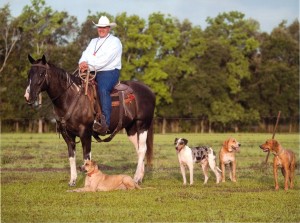
Darryl prides himself on his control of his dogs. They respect him: he’s the leader of their pack. “Making the dogs go to a certain place is an art. The reason I got so popular in penning wild cattle is my control of the dogs.” In training dogs, however, Darryl has a fondness for dogs that are definitely not in control of themselves. “I can bring down a dog that’s out of control. But if you’ve got a lazy dog, you can’t bring him up. He’s got to have the heart to do the work. I like dogs that are hot to go.”
Puppies learn from experienced dogs. Darryl will take only one puppy out at a time. “If you bring out two or three dogs that don’t know anything, they’ll get to playing around in the pasture and they’ll think they’re on a picnic.” A single puppy will try to imitate the older dogs. Once he gets the idea, it’s in his blood to love the work. Darryl tries not to start his puppies too soon, because the rank cattle he deals with could butt a young puppy too hard and make him quit the job. Older puppies will jump right back in. “I try to take puppies out when I know it’s not going to be too bad. They learn how to climb in the trailer, how to follow the horses, and how to get ahead of the cattle when I give them the signals. If a puppy enjoys what he’s doing, I’ll let him keep going. If he isn’t learning, I put him up and let him sit. But sometimes I do start them too early. I get excited with them; I see so much potential that I just keep pushing the envelope.”
Black dogs don’t do well in our hot, muggy weather. Darryl prefers light-colored dogs, but one of his favorite dogs, Snake, is a black Catahoula mix. Snake was a gift, because his owner couldn’t control him. “He was wild—he had so much heart.” Of course, he became a favorite. His other favorite is Blue, a registered Catahoula from North Louisiana. He was also an out-of-control gift. “Blue is now my lead dog. Blue knows when the cattle are going to break; he reads the cattle, and wants to do it without me giving the signal. I’m always on him, because he’s always ready to go. Guys see him and his energy and they ask me, ‘Is that dog on crack?’”
Darryl helps out the sheriff’s department by picking up loose horses. “When I started, I was catching stock that got away from people. But now I see a change. There are a lot of kids trail riding that don’t know how to take care of a horse. I pick up a lot of horses on the road or even tied up in town. People will turn a horse loose, call the sheriff to pick up a strange horse, and I’ll come by and find the horse standing in the same yard where he was raised. I’ve got pastures rented all over the place—I’ve got 178 head of cattle—and people will put horses there without telling me what they’re doing.” Darryl keeps the rescued horses—forty of them at the moment—at his ranch.
Darryl also drives a school bus. One time a little boy sat in the seat behind Darryl and wanted to talk about horses. “My daddy threw a horse away,” he said. “A big ol’ skinny brown horse. My daddy said he was going to die, so he threw him away before he died.” Darryl realized—with anger—that he had picked up that same horse the night before: a big, skinny, brown Thoroughbred that was wandering down his road and had almost been hit by a car. “Where did your daddy throw him away?” The boy pointed down the gravel road to Darryl’s place. “I looked in the mirror and I told that boy, ‘You tell your daddy to come pick up that damn horse.’ That man knew I picked up horses. He just dumped that horse on the road, and somebody could have hit him and gotten killed. I told the sheriff to go chew him out.”
Darryl’s favorite horse is a blaze-faced bay named Clyde. Clyde, half Belgian and half Mustang, started as a rodeo bucking horse, but was auctioned off to a man who wanted to pull cattle out of the woods. Unfortunately Clyde kept jumping out of his pen, and his owner lived near a busy road. “Take the horse, he’s going to get hurt,” he told Darryl. Darryl kept playing with Clyde in the round pen until the horse started coming up to him and he could put a rope around Clyde’s neck. “When I started riding him, he would buck a little, but not bad. But I did have to be careful with him, because he’d get scared if he took a bad lick from a cow. The horse I had before Clyde could take a bump and he knew how to position himself when the cow came at him. But Clyde—he was looking out for his stuff. He’d just take off!” Clyde, not a very attractive horse, got his name from some cowboys from Coushatta. “Where’d you get that thing, Darryl? He looks like he came out of a cornfield. He looks like a horse named Clyde!”
Darryl says, “When I was coming up, we were poor, with eleven kids in the family. I had some kinfolk that had some little bit of money, from oil wells on their land. They had some really nice horses and cattle. I used to think, ‘Boy, I wish someone would give me a chance…anything…a good horse…I could do something.’ When I was older, I’d say my prayers, and say I’d be ready to take care of a poor kid if that had to happen.” Darryl never had children of his own, but the day came that he was able to step up and offer to take care of two little kids, Melissa and Tray, whose mother had a drug problem. Melissa stayed for two years until her father took her back, but Tray stayed with Darryl from the time he was five until he was fourteen and his mother finally came for him. “I raised him as my own son,” says Darryl. “I used to preach to him a lot, but I told myself I wouldn’t force him to do anything. He’d ride out and watch me catch these bad cows. Then one day he told me he wanted to be a bull rider. ‘Tray,’ I said, ‘that’s a rough occupation.’ Tray said, ‘You told me I could be anything I wanted to be. Well, I want to be a bull rider!’
“Tray kept running his mouth about riding a calf. One time a bunch of people were watching, and they brought out a calf for him. The calf slammed Tray into the fence. Tray jumped up with his hat in his hand and said, ‘I didn’t cry! I didn’t cry!’ A tough little man.” Someone handed Darryl a Polaroid picture of Tray on the calf, and told Darryl to date it: “Your boy isn’t going to stop riding bulls.”
After showing in local rodeos, Tray began showing in Little Britches competitions. He attracted a lot of attention, because at that time he was the only black contestant. When he got on his first bull at his first Little Britches, the arena official came over to him and asked, “Do you know what you’re doing, boy?” Tray just leaned back on the bull so that the official could see the first-place belt buckle he was wearing. Tray won ten rodeos in a row that year. He eventually became a two-time state champion bull rider and a one-time state champion bareback rider. In bareback competition, Tray lost points on style, because he rode the horses like a bull rider—too far forward. But nothing could throw him.
“I taught Tray to respect everybody,” says Darryl. “He stood out, because he was the only black riding. I made sure he dressed right. Shirt tucked in. Hat on. The second rodeo I took him to, a lady came up to me and said, ‘Always make sure he’s dressed properly. He rides so good, someone in the stands might go up to a judge and point out that he’s not dressed right, and give the judge an excuse to take points off.’ In Colorado, when we went to the Worlds, the TV announcer pointed out Tray and spoke about how that young man was always so well-dressed.”
“When Tray was fourteen I was getting ready to adopt him, and he was attracting a lot of attention for his bull riding, and his mama took him from me because she saw dollar signs. He’s twenty now, and he still comes to see me. When he and Melissa were both with me, I’d take them along to ride with me when I penned cattle, and I’d pay them, and put their money in savings. Melissa bragged to her daddy that she had money. He was on drugs. He took her, tried to get the money, and, when he couldn’t, he abandoned her and his girlfriend in Texas. Melissa’s back with her mama now. They struggle. I was happy I kept Melissa as long as I did. I instilled some things in her mind. It was a pity I couldn’t raise her the way I raised Tray. I did for Tray what I always wanted someone to do for me.”

